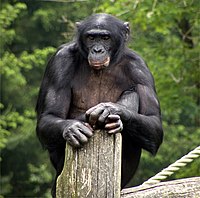
Photo from wikipedia
Captive breeding programmes are often a necessity for the continued persistence of a population or species. They typically have the goal of maintaining genetic diversity and minimizing inbreeding. However, most… Click to show full abstract
Captive breeding programmes are often a necessity for the continued persistence of a population or species. They typically have the goal of maintaining genetic diversity and minimizing inbreeding. However, most captive breeding programmes have been based on the assumption that the founding breeders are unrelated and outbred, even though in situ anthropogenic impacts often mean these founders may have high relatedness and substantial inbreeding. In addition, polygamous group‐breeding species in captivity often have uncertain pedigrees, making it difficult to select the group composition for subsequent breeding. Molecular‐based estimates of relatedness and inbreeding may instead be used to select breeding groups (≥two individuals) that minimize relatedness and filter out inbred individuals. swinger constructs breeding groups based on molecular estimates of relatedness and inbreeding. The number of possible combinations of breeding groups quickly becomes intractable by hand. swinger was designed to overcome this major issue in ex situ conservation biology. The user can specify parameters within swinger to reach breeding solutions that suit the mating system of the target species and available resources. We provide evidence of the efficiency of the software with an empirical example and using simulations. The only data required are a typical molecular marker data set, such as a microsatellite or SNP data set, from which estimates of inbreeding and pairwise relatedness may be obtained. Such molecular data sets are becoming easier to gather from non‐model organisms with next‐generation sequencing technology. swinger is an open‐source software with a user‐friendly interface and is available at http://www.molecularecology.flinders.edu.au/molecular-ecology-lab/software/swinger/swinger/ and https://github.com/Yuma248/Swinger.
Journal Title: Molecular Ecology Resources
Year Published: 2017
Link to full text (if available)
Share on Social Media: Sign Up to like & get
recommendations!